Best AI Tools for Sales Enablement in 2026
In this blog, we’ll explore the best AI tools for sales enablement in 2026, showing how they help streamline workflows, boost proposal quality, and ultimately win more business.
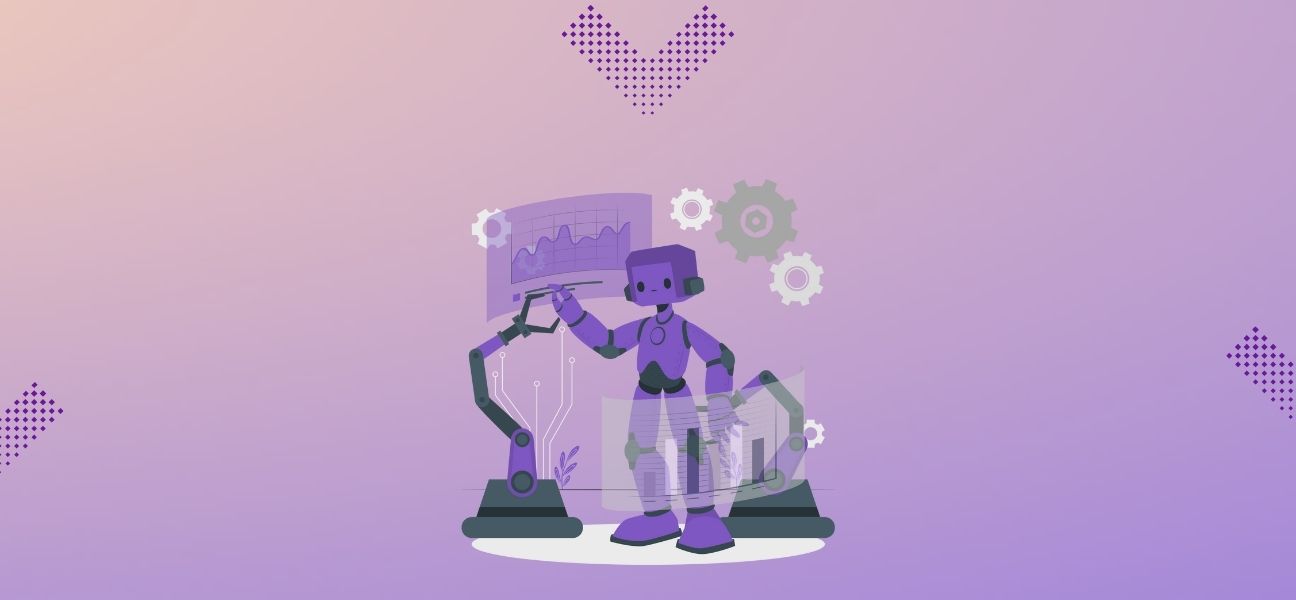
Ever wonder why your sales team isn't hitting their targets? It's not always about the leads or the pitch. In fact, sales reps spend only 28% of their week actively selling, with the remaining time consumed by administrative tasks, internal meetings, and data entry.
This imbalance affects productivity and revenue potential. But what if you could automate many of these tasks and refocus that time on closing more deals? This is where AI-powered sales tools come in. By automating routine tasks, improving response accuracy, and providing real-time insights, AI is transforming how sales teams operate.
In this blog, we’ll explore the best AI tools for sales enablement in 2026, showing how they help streamline workflows, boost proposal quality, and ultimately win more business.
TL;DR
- Sales enablement equips teams with tools, resources, and content to close more deals and engage customers effectively.
- AI enhances sales enablement by automating routine tasks, personalizing outreach, and providing real-time insights.
- Key AI benefits for sales teams include faster RFP responses, smarter sales forecasting, and automated lead scoring.
- Choosing the right sales enablement tools requires considering your goals, budget, integrations, and ease of use.
- AI tools like content management platforms and forecasting software are transforming how sales teams work, driving efficiency and growth.
What is Sales Enablement?
Sales enablement is all about giving your sales team the tools, resources, and information they need to do their job better and close more deals. It’s about helping them engage with customers more effectively and make the sales process smoother. This includes providing them with helpful content, training, insights, and tools that help them perform at their best.
Here’s what sales enablement looks like in practice:
- Content Management: Sales reps need quick access to the right content, like brochures, emails, or case studies. This helps them talk to customers faster and more effectively.
- Training and Coaching: Continuous learning is key. Sales reps need training to stay up-to-date on products and selling techniques. Good coaching helps them improve and do their job better.
- Data and Analytics: Sales teams need data to make smart decisions. It helps them understand customer needs and figure out what works best in their sales strategy.
- Collaboration Tools: Sales reps don’t work alone. They need tools that help them share information with other team members and stay on the same page with everyone.
As we move into 2026, AI is becoming a bigger part of sales enablement. This will not only save time but also make sales reps more efficient and help them make better decisions, ultimately leading to more deals closed.
Also Read: How to Write a Sales Proposal Template That Drives More Wins
The Role of AI in Sales Enablement
We all know how much time is wasted on repetitive tasks, like sorting through leads, following up with prospects, and creating reports. These tasks take away from what your sales team should be focusing on: actually closing deals. But with AI, things can change for the better.
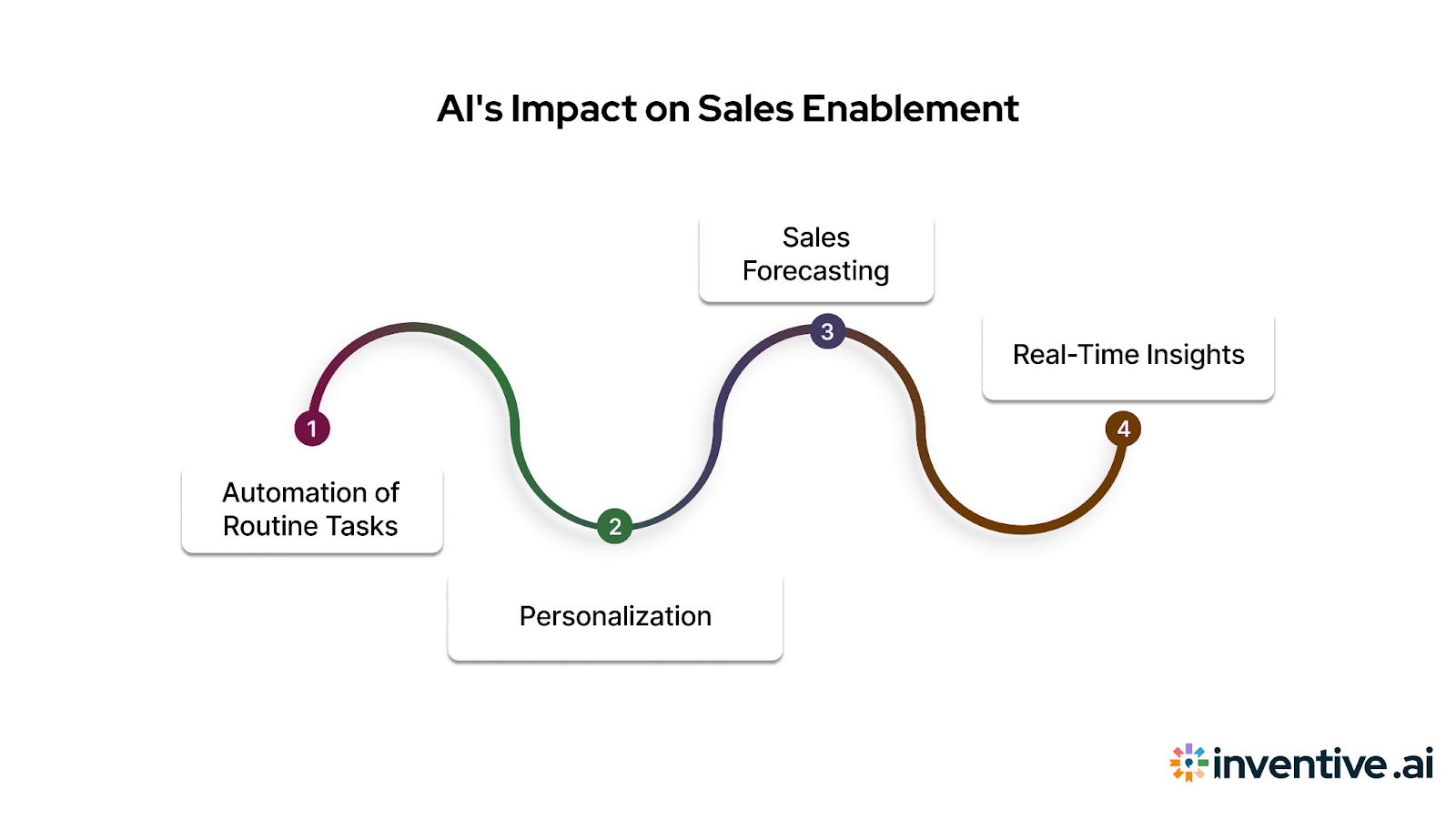
1. Automation of Routine Tasks
We’ve all been there: spending hours manually sorting leads or sending follow-up emails. It's time-consuming and drains the productivity of your sales team. But with AI, these routine tasks can be automated.
AI helps by scoring leads, scheduling follow-ups, and even generating reports, all without the need for human intervention. This lets your team focus on high-value tasks like connecting with prospects and closing deals.
Instead of spending time figuring out which leads to prioritize, AI can automatically evaluate and prioritize leads based on their likelihood to convert, helping your sales reps focus on the most promising prospects at the optimal moment.
2. Personalization
We’ve all experienced how difficult it is to send a generic email or sales pitch to a customer. It doesn’t feel personal, and it doesn’t work. But with AI, your sales reps can create personalized, tailored outreach based on a prospect’s past behavior and preferences. By analyzing customer data, AI helps deliver relevant content and messages, increasing the chances of getting a response and moving the deal forward.
Salesforce reports that 66% of customers expect businesses to understand their unique needs. AI enables sales teams to deliver just that with personalized interactions.
3. Sales Forecasting
We’ve all dealt with the uncertainty of trying to predict sales, leading to missed targets or underutilized resources. But with AI, forecasting is more accurate than ever. AI analyzes past data and trends to predict future sales opportunities. This helps your sales team better plan their strategies, allocate resources, and focus on the most promising deals.
AI-powered tools predict which deals are most likely to close by examining historical sales data, allowing sales managers to adjust their approach and increase their win rate.
4. Real-Time Insights
We’ve all been in situations where a sales rep struggles to decide the best next step with a prospect. Should they send an email or make a call? AI steps in to help here by providing real-time insights based on past interactions, customer behavior, and market trends. This enables sales teams to make smarter decisions quickly, ensuring they don’t miss the right moment to act.
AI analyzes the timing and content of previous communications and suggests the ideal moment to follow up, giving your team the confidence to engage prospects at the perfect time.
By using AI, you’re saving time, reducing mistakes, and enabling your sales team to operate more effectively. No more wasting time on manual tasks, guessing which leads to pursue, or missing opportunities. With AI, your team can work smarter, not harder, leading to more deals closed.
10 Best AI Tools for Sales Enablement in 2026
AI-powered sales enablement tools not only help automate repetitive tasks but also enhance your sales team's efficiency, improve proposal quality, and ultimately increase win rates. Below, we’ve listed the top 10 AI tools that are transforming the sales enablement space in 2026.
Inventive AI
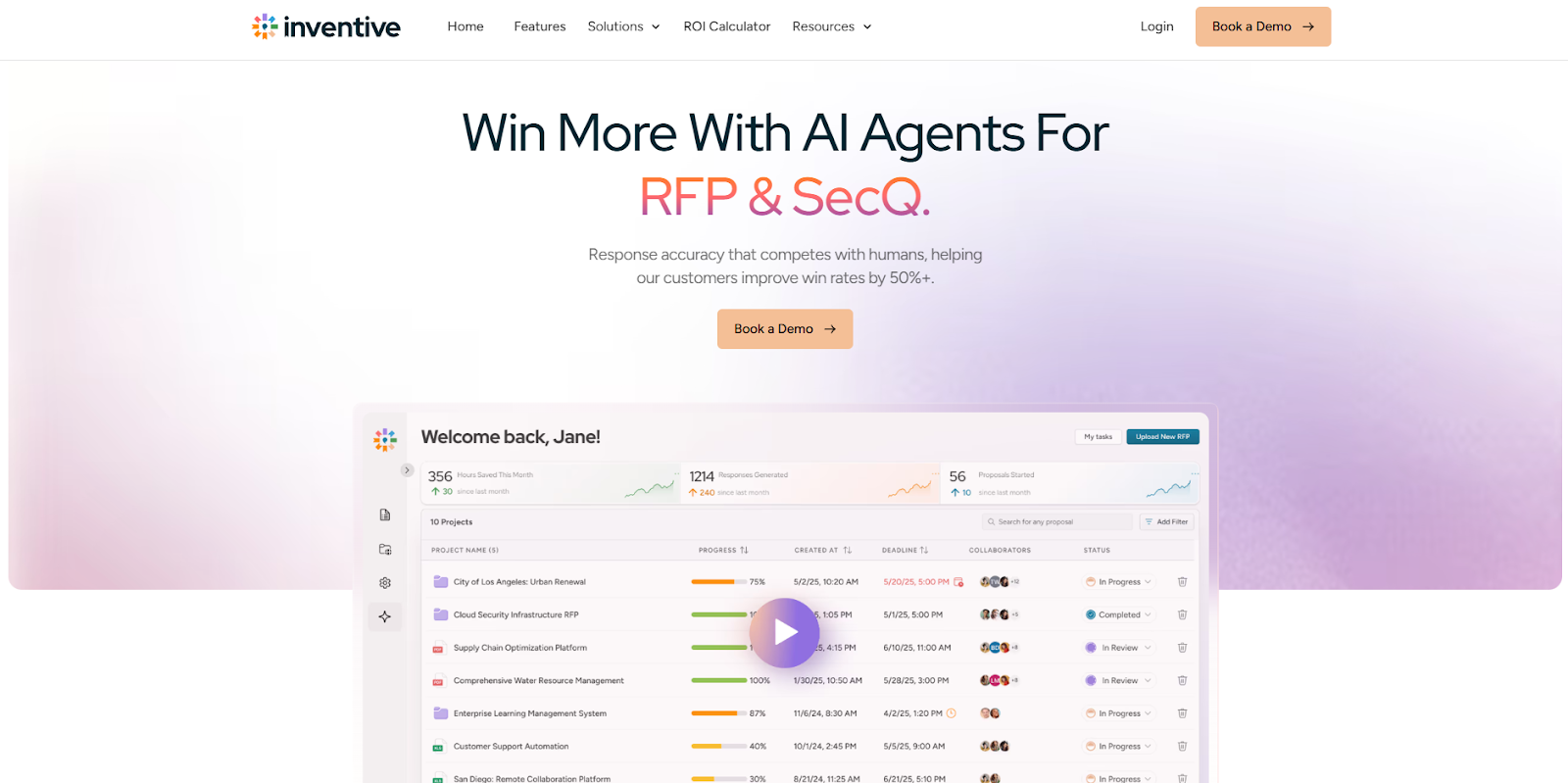
Inventive AI is an AI-powered RFP response software designed to transform the RFP management process for sales teams. By using advanced AI algorithms, it generates faster and more accurate proposal drafts, helping teams save their valuable time and improve the quality of their submissions. With features like automatic content generation and data-driven proposal optimization, Inventive AI simplifies the complex workflow involved in RFPs, allowing your team to focus on winning more deals.
Pros:
- 10x Faster Proposals: Generate accurate, tailored proposals in minutes, slashing drafting time and accelerating your sales cycle.
- Unmatched Accuracy: Achieve 95% accuracy with AI-driven content optimization, ensuring every proposal is precise, relevant, and client-ready.
- Error-Free Proposals: Minimize human errors with AI-powered automation, ensuring flawless proposals every time.
- Customizable to Your Workflow: Tailor Inventive AI to seamlessly integrate with your team’s unique processes, boosting productivity and efficiency.
- Real-Time Collaboration: Enable smooth teamwork with real-time updates, task tracking, and easy sharing, ensuring alignment and faster approvals.
- Data-Driven Insights: Access powerful analytics that track proposal success and engagement, allowing continuous improvement and smarter decision-making.
Cons:
- Initial setup time: It requires some time and effort to fully integrate and customize the platform for your team’s specific needs.
- Learning curve: Sales teams may need some time to get fully accustomed to the features and interface.
Inventive AI’s AI RFP Agent is a game-changer for sales teams, helping them deliver faster, more accurate, and highly relevant proposals that boost win rates by 50%.
Highspot

Highspot is a comprehensive sales enablement platform that helps sales teams manage content, training materials, and analytics in one place. The platform empowers sales reps with real-time access to resources they need to close deals faster. With powerful analytics and content management features, Highspot ensures sales reps have the right content at the right time, and it helps track content performance.
Pros:
- Real-time content management: Keeps the content updated and easily accessible to sales reps.
- Analytics & insights: Provides data on content performance, helping sales teams understand what works.
Cons:
- Overwhelming features for smaller teams: Its variety of features might be too much for smaller teams with limited resources.
- Expensive for smaller businesses: Pricing may be a concern for smaller teams that are just getting started.
- Limited Offline Access: The platform depends on cloud connectivity, making it difficult to access content in offline or low-connectivity areas.
Highspot offers an all-in-one solution for managing sales content and training, ensuring that your sales team is always equipped with the best resources to close deals.
Seismic

Seismic is an AI-powered sales enablement tool that helps teams with content management, personalized recommendations, and real-time analytics. Seismic’s platform is designed to make sales content more accessible and relevant, improving sales reps' ability to engage customers effectively.
By personalizing content based on the buyer’s profile, Seismic enhances the sales experience and increases the chances of a successful sale.
Pros:
- Personalization: Delivers personalized content recommendations based on buyer behavior.
- Strong integrations: Integrates seamlessly with other sales tools and CRMs.
Cons:
- Integration challenges: Can be complex when integrating with other systems.
- Learning curve: May require time to get familiar with the platform and its full range of features.
- Customization Limits: Even though the platform offers personalization, there are limitations in how much it can be customized to fit unique sales processes.
Seismic’s AI-powered platform is a valuable tool for delivering personalized content that aligns with customer needs, enhancing sales outcomes.
Outreach

Outreach is a powerful sales engagement platform that uses AI to automate communication workflows, manage follow-ups, and optimize outreach strategies. With AI-driven features, Outreach helps sales teams personalize their outreach, track performance, and increase engagement.
This platform is designed to improve response rates by automating manual tasks and enhancing the overall sales process.
Pros:
- Optimized workflows: Automates repetitive tasks and makes the outreach process more efficient.
- Automated follow-ups: Ensures timely follow-ups with prospects.
Cons:
- Pricing: Could be too expensive for smaller teams or businesses with a limited budget.
- Requires time to set up: Full integration with CRM and other tools can take time.
- Integration Issues: Users face significant integration issues, especially regarding Salesforce connectivity and data handling challenges.
- Limited Features: Lacks essential tools for reporting and content management, restricting its effectiveness.
Outreach enhances the engagement process by automating communication and tracking, helping sales teams increase productivity and response rates.
If Outreach doesn’t meet your needs, Inventive AI is a powerful alternative that offers significant advantages. While Outreach automates communication workflows and follow-ups, Inventive AI goes further by automating the entire proposal generation process, optimizing content, and enabling real-time collaboration, all powered by AI.
Gong.io
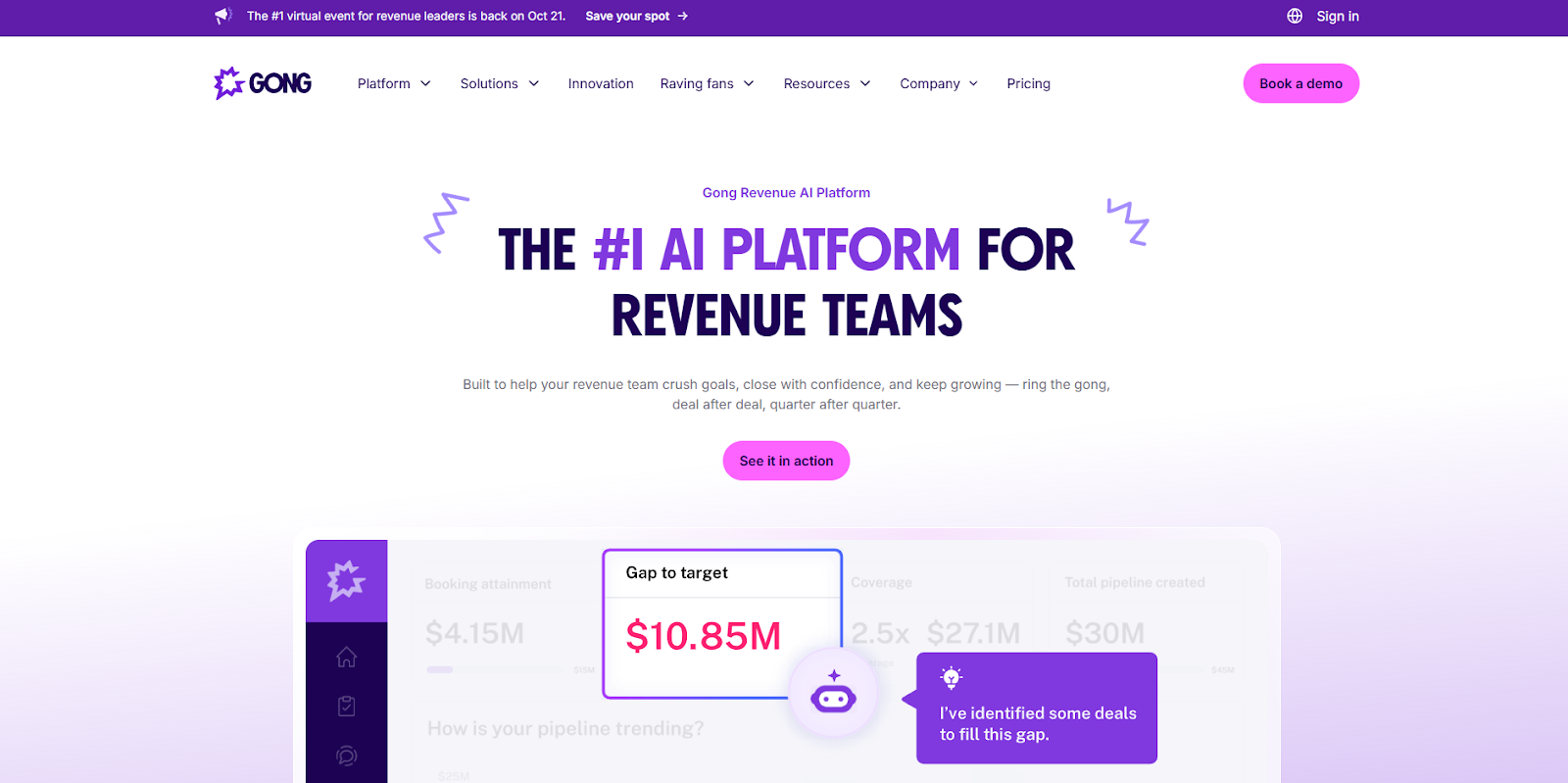
Gong.io uses AI to analyze sales calls, meetings, and emails, providing insights that help improve sales strategies and customer interactions. By capturing every interaction, Gong.io helps teams understand what’s working in their conversations and where they can improve. The platform also offers coaching tools that help reps refine their approach and increase their success rate.
Pros:
- Real-time conversation analysis: Analyzes sales calls and meetings to provide actionable insights.
- Sales coaching: Offers real-time feedback to improve sales techniques.
Cons:
- Pricing for small teams: Gong.io’s pricing can be expensive for smaller businesses.
- Short Calls Aren't Tracked: Doesn’t record or analyze calls under 60 seconds, missing valuable micro-interactions.
- Delayed Processing: Can take up to 60 minutes for your call to become available after recording, delaying insights.
- Learning curve: New users may need time to get accustomed to the platform’s features and interface.
Gong.io’s AI-driven conversation analytics help sales teams improve their customer interactions and close deals more effectively.
Showpad

Showpad helps sales teams access and manage content easily. With Showpad, sales reps have all the materials they need to engage prospects effectively. The platform also includes real-time data and integration features that enhance communication between sales and marketing teams.
Pros:
- Centralized content library: All sales content is stored in one place, making it easy for reps to find what they need.
- Easy integrations: Works well with other sales tools and CRMs.
Cons:
- Limited advanced analytics: The platform may lack more in-depth analytics features.
- Learning curve: Some users may take time to adjust to the interface and features.
- Slow Loading Times: Some users experience slow loading times when accessing content, which can hinder real-time sales engagement.
Showpad helps keep your sales team aligned with the right content, empowering them to engage prospects more effectively.
Clari

Clari is an AI-powered sales enablement platform that provides real-time visibility into pipeline health, helping teams forecast accurately and prioritize high-potential deals. By analyzing sales data and trends, Clari helps teams stay on top of their pipeline and make more informed decisions.
Pros:
- Predictive analytics: Provides insights into future sales opportunities.
- Real-time pipeline tracking: Helps teams track deal progress and make adjustments.
Cons:
- Integration with CRM tools: Requires integration with existing CRM tools, which may take time.
- Pricing: This platform can be expensive for smaller teams.
- Complex Setup for Pipelines: Customizing Clari for specific pipelines can be time-consuming and challenging for smaller teams.
- Basic Reporting: Clari’s reporting features are limited and lack customization for advanced data analysis.
Clari’s real-time pipeline tracking and predictive analytics help teams stay on top of deals, making smarter decisions to drive sales.
Chorus.ai

Chorus.ai uses AI to analyze sales calls, meetings, and other customer interactions to offer valuable insights. The platform helps sales teams optimize their conversations, providing actionable feedback on how to engage prospects more effectively.
Pros:
- Call summarization: Provides summaries of sales calls for easier analysis.
- Sales coaching: Offers recommendations for improving sales interactions.
Cons:
- Learning curve: It may take some time for new users to fully understand the platform.
- Limited integrations: Some integrations with other tools may be more difficult to set up.
- Inaccurate Transcriptions: Transcriptions can be unreliable, especially with background noise or poor audio.
Chorus.ai’s conversation analytics offer real-time feedback that helps sales teams refine their strategies and improve engagement.
If you're looking for an all-in-one solution to enhance your sales process, Inventive AI is the perfect alternative, offering a more reliable, complete solution that automates proposal creation, enhances content, and streamlines workflows.
Allego
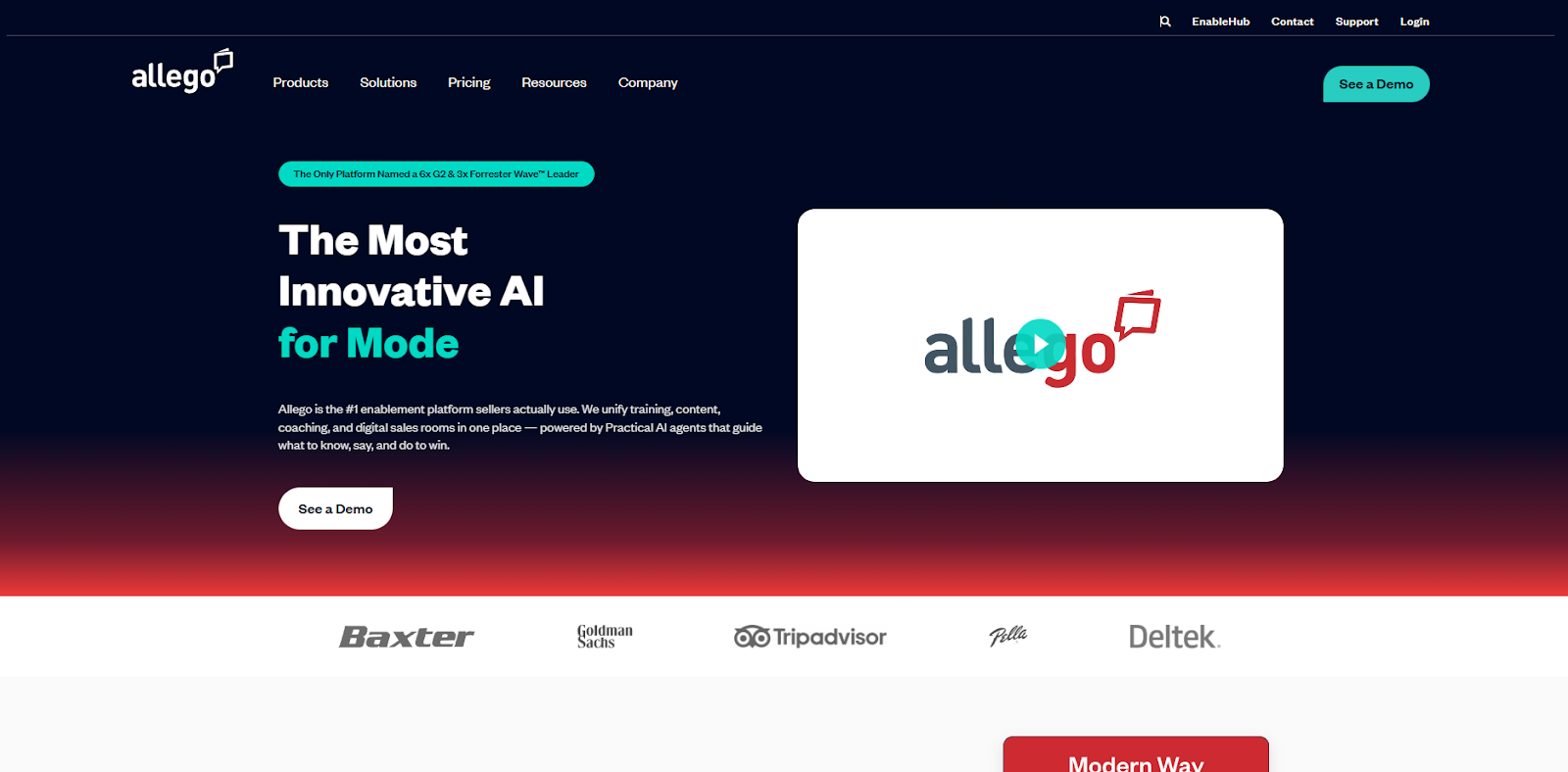
Allego focuses on AI-powered training and learning, helping sales teams improve their skills over time. The platform offers continuous learning and feedback-driven coaching, ensuring that reps are always improving and ready for new challenges.
Pros:
- Continuous learning: Helps reps stay sharp with ongoing training.
- Feedback-driven coaching: Provides personalized coaching based on individual performance.
Cons:
- Limited content library: Could benefit from a wider variety of training materials.
- Weak Analytics: Allego's analytics lack detailed insights, limiting sales teams' ability to track and optimize performance effectively.
- Pricing: Can be expensive for smaller teams.
Allego’s focus on continuous learning and coaching ensures that sales teams are always improving their skills, which leads to better performance.
SalesLoft
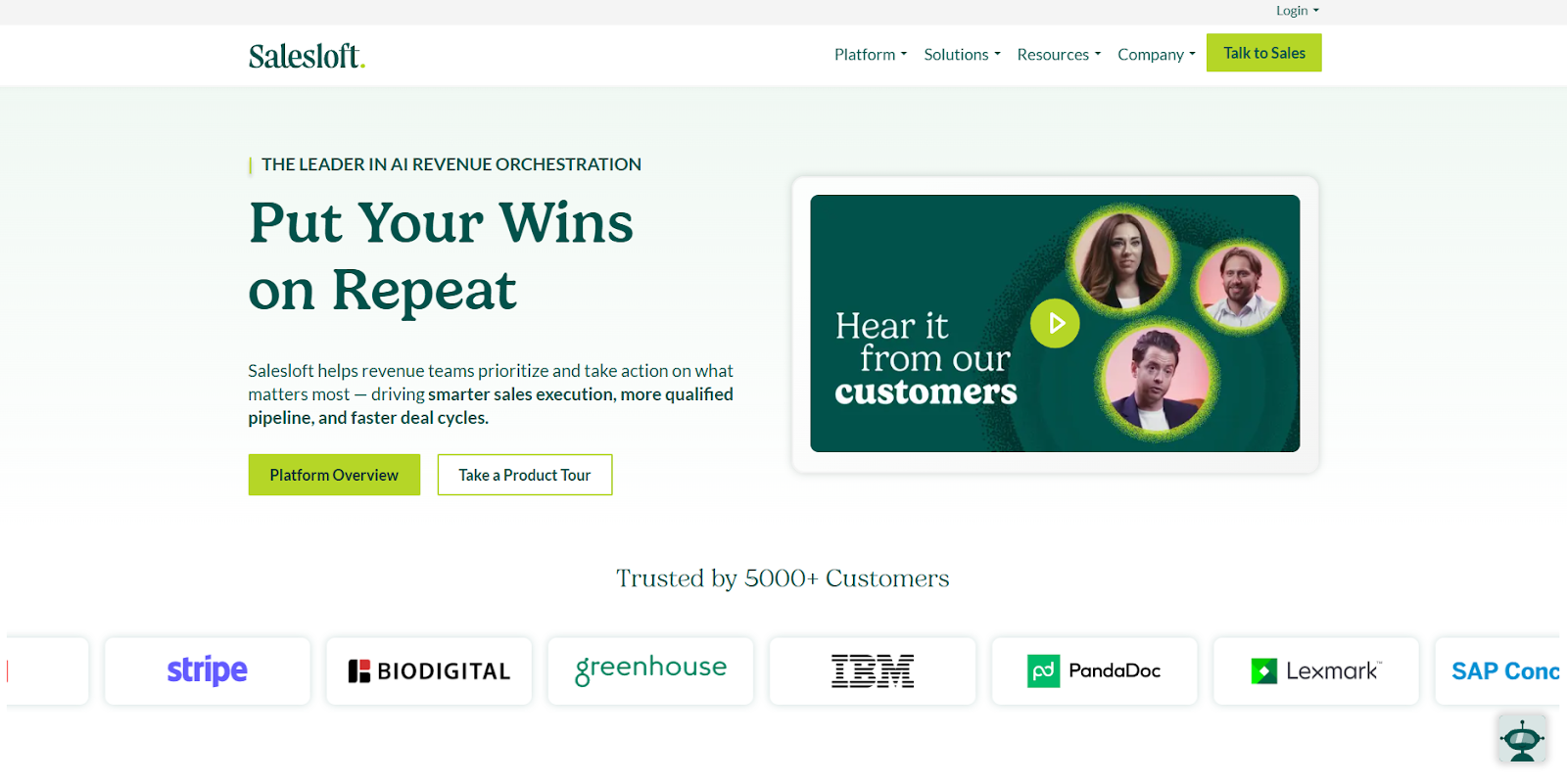
SalesLoft is an AI-driven sales engagement platform that helps teams automate workflows, track sales activities, and improve performance in real time. It’s designed to optimize outreach, improve engagement, and boost productivity.
Pros:
- Advanced automation: Automates sales tasks and workflows to save time.
- CRM integration: Integrates with major CRM platforms for a seamless experience.
Cons:
- Expensive features: Advanced features can be pricey for smaller businesses.
- Customization required: Some teams may need to spend time customizing the platform to fit their needs.
- High Support Dependency: Users often need to rely on SalesLoft’s support for troubleshooting and advanced configurations, causing delays.
SalesLoft’s AI-driven automation tools optimize outreach and engagement, boosting productivity and improving sales outcomes.
With the right AI-powered tools, your sales team can automate routine tasks, access valuable insights, and ultimately close more deals. As AI continues to grow, these tools will only become more powerful, helping sales teams work smarter and more efficiently.
Also Read: RFP Content Library: The Complete Guide to AI Automation
5 Use Cases for AI in Sales Enablement
Sales teams face countless challenges, from managing a growing list of leads to constantly juggling repetitive tasks, staying organized and focused can be overwhelming. But with AI tools at your disposal, many of these challenges can be addressed more efficiently. Here are five practical ways AI is helping sales teams excel:
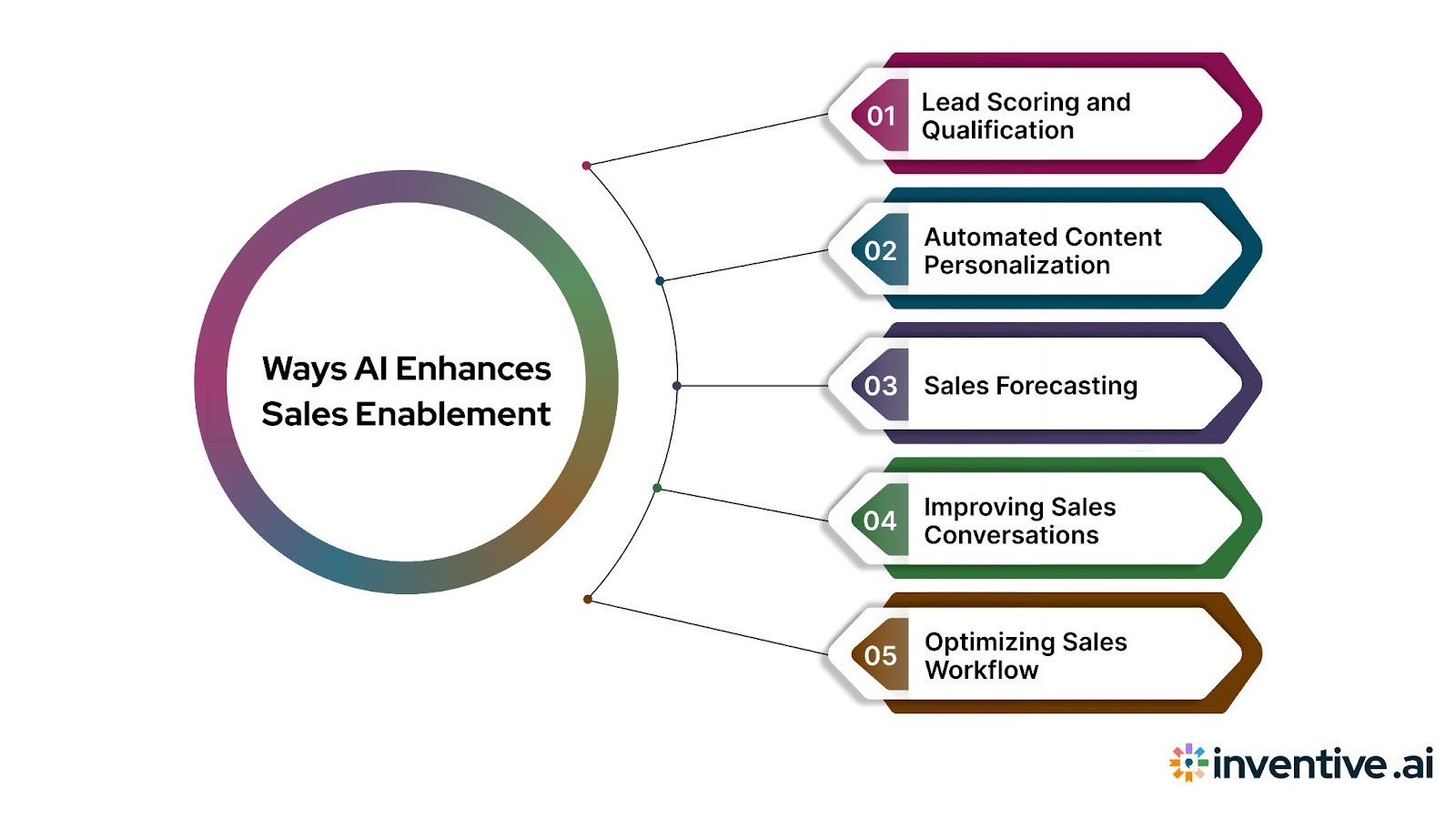
1. Lead Scoring and Qualification
Sales reps often find themselves overwhelmed by a flood of leads, many of which may not be worth their time. Sorting through these leads and determining which ones are worth pursuing can take up valuable time that could be spent on more meaningful conversations.
The Solution: AI simplifies this process by analyzing past interactions, buyer behavior, and demographic data, predicting which leads are most likely to convert. By using AI to score leads, sales reps can prioritize high-value prospects and increase their chances of closing deals faster.
2. Automated Content Personalization
Generic content is a common pitfall for sales teams. Sending the same email or content to all prospects rarely yields strong results. Without personalized communication, potential customers may not feel engaged or understood.
The Solution: AI helps sales teams personalize outreach by analyzing buyer behavior and preferences. It then suggests content that aligns with each prospect's interests, ensuring that every interaction feels relevant and valuable.
3. Sales Forecasting
Without accurate sales forecasts, it’s difficult to plan resources, set realistic goals, or even gauge team performance. Relying on manual tracking can be unreliable, and the lack of real-time insights often leaves teams in the dark.
The Solution: AI takes the guesswork out of sales forecasting by analyzing historical data, current trends, and buyer behaviors to predict future sales. With AI-powered forecasting tools, sales teams can make smarter decisions based on real-time data, improving planning and resource allocation.
4. Improving Sales Conversation
Sales teams often find themselves spending excessive time drafting responses to RFPs, managing content, and coordinating with subject matter experts (SMEs). This not only delays the proposal process but also diverts attention from engaging with prospects and closing deals.
The Solution: AI-powered conversation tools like Inventive AI's AI Sales Agent simplify the RFP response process by automating the creation of proposal drafts, centralizing sales-ready content, and ensuring brand consistency. This allows sales teams to produce accurate, on-brand responses in a fraction of the time, enabling them to focus more on active deals and less on administrative tasks.
5. Optimizing Sales Workflow
Sales reps are constantly drained down by administrative tasks, responding to emails, scheduling meetings, and managing follow-ups. These repetitive tasks eat into the time they could be spending on high-impact activities like building relationships with prospects.
The Solution: AI automates many of these routine tasks. From scheduling meetings to drafting follow-up emails, AI frees up valuable time for sales reps to focus on more strategic activities.
AI is transforming sales enablement by solving common challenges, boosting efficiency, and giving sales reps the tools they need to succeed. By automating routine tasks, providing actionable insights, and personalizing content, AI helps sales teams work smarter, not harder, ultimately leading to more closed deals and higher win rates.
How to Choose the Right Sales Enablement Tools
Choosing the right sales enablement tools is essential for streamlining your sales processes and ensuring your team operates at peak efficiency. With so many options available, selecting the right tools can feel overwhelming.
Here’s a simple guide to help you make the best choice for your team:
1. Identify Your Goals and Objectives
Before diving into the selection process, clearly define what you want to achieve. Are you aiming to improve response times, increase win rates, or optimize your content management? Having specific goals will guide you in selecting tools that align with your objectives and help measure your success.
2. Consider Budget Constraints
While it’s tempting to go for the most feature-rich tools, it’s important to stay within your budget. Evaluate the cost against the value the tool provides. Tools should be an investment that drives efficiency and generates a positive return on investment (ROI).
3. Look for Integrations
Your sales tools must work well with the existing software you use. Whether it’s CRM, email platforms, or calendar applications, seamless integrations reduce the time spent on manual data entry and streamline workflows.
4. Opt for User-Friendly Solutions
The best tools are the ones that your team can adopt quickly. A user-friendly interface reduces the learning curve, making onboarding faster and easier. The simpler the tool, the more likely your team will fully embrace it.
5. Don’t Forget Security and Compliance
Especially when dealing with sensitive customer information, security is non-negotiable. Make sure the tool meets your company's security standards and complies with relevant regulations, such as GDPR, HIPAA, or SOC 2, to protect both customer data and your business.
By carefully considering these factors, you can select sales enablement tools that not only enhance your team's performance but also contribute to long-term success.
Challenges and Considerations with AI Tools
While AI tools offer immense benefits for sales enablement, it’s important to understand the potential challenges and considerations before implementing them in your sales process. Here are some common obstacles sales teams face when adopting AI, along with ways to address them:
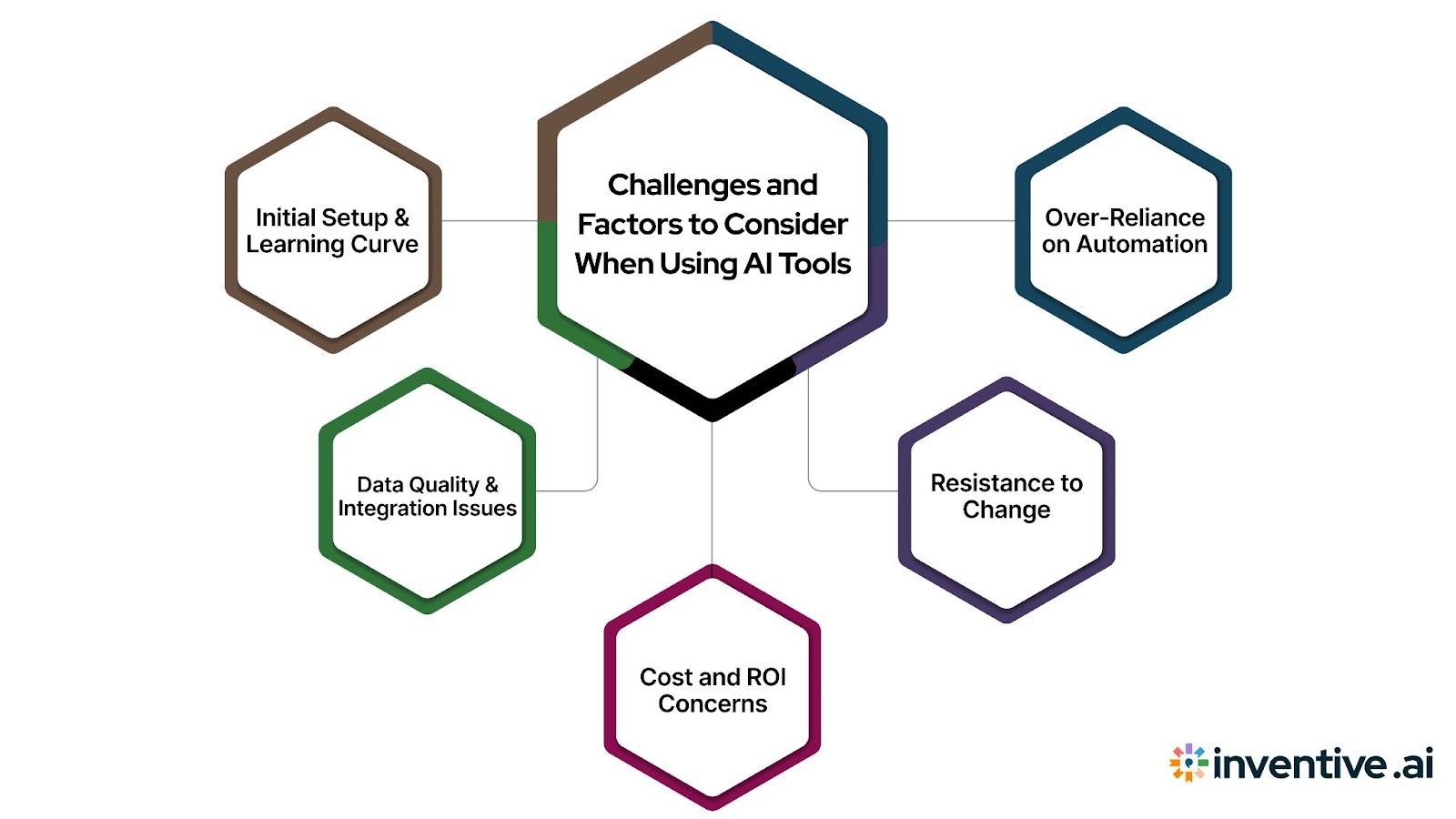
1. Initial Setup and Learning Curve
Implementing AI tools often requires an initial setup and customization, which can take time and effort. Sales teams may also need time to adapt to new software, understand its features, and integrate it into their workflow.
Make sure you choose AI tools with easy-to-follow onboarding materials and strong customer support to help your team settle in quickly.
2. Data Quality and Integration Issues
AI tools rely on large amounts of accurate and up-to-date data to make smart decisions. However, if your data is messy, incomplete, or siloed in different platforms, it can be difficult for AI tools to provide reliable insights.
Ensure that your team’s data is clean, organized, and integrated across platforms before implementing AI tools.
3. Cost and ROI Concerns
Some AI tools come with high upfront costs, which can be a barrier for smaller businesses or teams with limited budgets. It’s important to weigh the cost against the expected ROI and assess if the investment aligns with your sales goals.
Consider starting with scalable solutions that fit within your budget and offer a clear ROI, like faster proposal responses or increased win rates.
4. Resistance to Change
Sales teams can sometimes be resistant to adopting new technologies, especially if they are comfortable with existing workflows. AI adoption can seem intimidating, particularly if it involves automating tasks previously handled by human reps.
Foster a culture of change by involving the sales team in the decision-making process, offering training, and highlighting the efficiency gains they will experience.
5. Over-Reliance on Automation
While automation is one of AI’s biggest advantages, relying too heavily on it can lead to missed opportunities for human connection. Sales reps might skip personalizing communications or fail to pick up on subtle cues that could make a difference in a deal.
Use AI to enhance and not replace human interactions. Ensure that your team continues to engage with prospects on a personal level, while AI handles the repetitive tasks.
By addressing these challenges head-on, your team can harness the full potential of AI tools, making them a powerful asset in your sales enablement strategy.
Why Inventive AI Is The Best Sales Enablement Tool For You
When it comes to sales, time and accuracy are everything. Inventive AI helps your sales team work smarter and faster by automating time-consuming tasks and improving proposal quality.
Here’s why Inventive AI is the best tool for sales enablement:
1. Automated RFP Response
Creating proposals can take a lot of time. Inventive AI automates the process, allowing your sales team to generate high-quality proposals quickly and accurately. This means more time spent focusing on prospects and less time writing proposals.
2. 95% Accuracy
Accuracy is key in sales, and Inventive AI ensures that your proposals are not only fast but also precise. With 95% accuracy, you can trust that your proposals will meet your client’s needs and improve your chances of winning deals.
3. 10x Faster Responses
Speed matters, and Inventive AI helps your team respond to RFPs 10x faster than traditional methods. By automating the drafting process, your sales reps can focus more on building relationships with clients and closing sales.
4. Better Collaboration
Inventive AI also makes teamwork easier. It helps your team collaborate on proposals and keeps everyone aligned, so your messaging is consistent and accurate every time.
Final Thoughts
Adopting AI-powered sales enablement tools can dramatically enhance your sales team's productivity and success. By using the right tools, like Inventive AI, your team can automate manual tasks, enhance proposal accuracy, and close deals faster. AI for sales enablement offers a competitive advantage that not only boosts efficiency but also drives revenue growth.
Imagine being able to generate high-quality proposals in a fraction of the time, with fewer mistakes, and higher win rates. That is the power of Inventive AI. It is designed to help your team work smarter, not harder, transforming your sales process into a well-oiled machine.
Ready to see the difference AI can make in your sales process? Book a demo with Inventive AI today and discover how our AI-powered tools can elevate your proposal management, accelerate your sales cycle, and improve your win rates.
Frequently Asked Questions (FAQs)
1. What is sales enablement?
Sales enablement is about equipping your sales team with everything they need to engage with customers more effectively and close deals faster. This includes providing them with the right content, tools, training, and real-time data that help them sell smarter. With the right sales enablement resources, your team can work more efficiently, build relationships with prospects and drive sales.
2. How does AI help in sales enablement?
AI is a game-changer for sales teams. By automating time-consuming tasks like lead scoring, data analysis, and content personalization, AI frees up valuable time for sales reps. It also helps sales teams make smarter decisions by providing them with insights into customer behavior, trends, and preferences. With AI, sales teams can engage prospects more effectively, respond quicker, and ultimately close more deals.
3. How can AI improve RFP responses?
Responding to RFPs can be tedious and time-consuming. AI helps simplify this process by automating tasks like drafting, reviewing, and refining proposals. It ensures accuracy and consistency across responses, reducing errors and speeding up the time it takes to submit high-quality proposals. With AI, your team can generate tailored, professional proposals faster, increasing your chances of winning the deal.
4. What is the best sales enablement tool for AI?
Inventive AI is one of the best tools for sales enablement, especially for automating RFP responses. It speeds up the proposal process, increases accuracy, and improves overall sales performance. By using Inventive AI, your sales team can create faster, more accurate responses, ultimately improving win rates and freeing up time for high-value activities.
5. How does Inventive AI integrate with other sales tools?
Inventive AI integrates easily with your existing sales tools, like CRMs and communication platforms, to enhance your current workflow. This integration means you don’t need to overhaul your entire sales process. Inventive AI helps you bring everything together in one easy-to-use platform, making it easier to automate processes, access valuable insights, and collaborate with your team more effectively.

90% Faster RFPs. 50% More Wins. Watch a 2-Minute Demo.
After witnessing the gap between generic AI models and the high precision required for business proposals, Gaurav co-founded Inventive AI to bring true intelligence to the RFP process. An IIT Roorkee graduate with deep expertise in building Large Language Models (LLMs), he focuses on ensuring product teams spend less time on repetitive technical questionnaires and more time on innovation.
Knowing that complex B2B software often gets lost in jargon, Hardi focuses on translating the technical power of Inventive AI into clear, human stories. As a Sr. Content Writer, she turns intricate RFP workflows into practical guides, believing that the best content educates first and earns trust by helping real buyers solve real problems.


